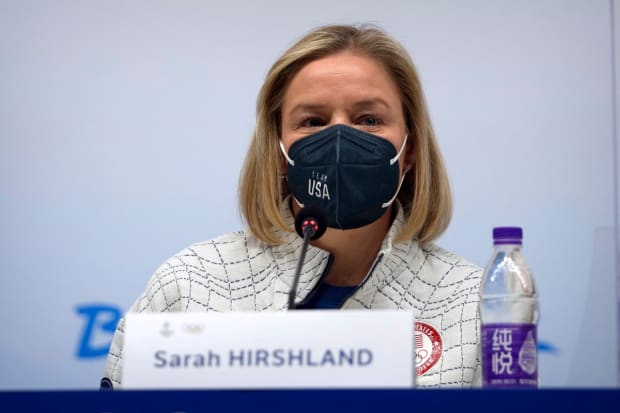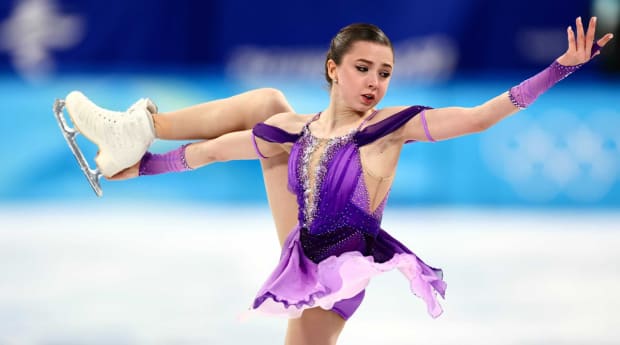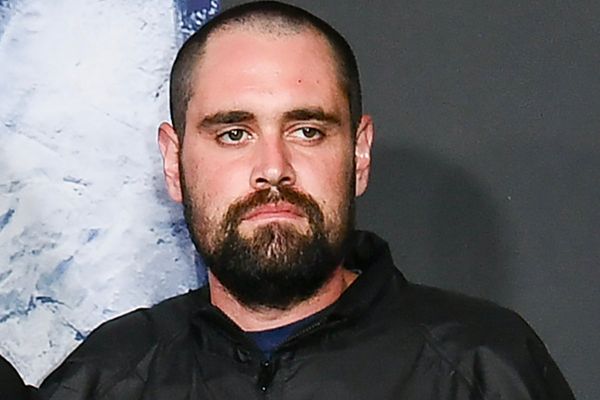BEIJING — Sarah Hirshland watches Kamila Valieva and sees what we all see: An extraordinary figure skater whose presence here represents, on a fundamental level, a threat to the Olympics.
“When the integrity of competition comes into question in a way like we’ve seen here, you run the risk of compromising the integrity of the entire system,” Hirshland, the U.S. Olympic and Paralympic Committee CEO, told a small group of reporters Thursday. “And we’ve got to fix it.”

Mark Schiefelbein/AP
Valieva is a wondrous 15-year-old Russian skater who won the team event, is in line to win gold in the individual event, and whose positive test for the banned drug trimetazidine has cast a pall over the Games. When the Court for Arbitration in Sport (CAS) cleared Valieva to keep competing, Hirshland released a harsh statement condemning the decision that she said Thursday was “probably not as strong as my real emotions are on it. This is just really frustrating and difficult.”
The outrage is multi-pronged. According to the International Testing Agency, Valieva submitted a test on Dec. 25 during the Russian national championships. Her sample was not run until Feb. 7, after she won gold here: “I think the most important thing is the timing of the sample,” Hirshland said. “It’s outside of the parameters of what the code dictates.” Valieva’s lawyers say that the skater failed the test because of contamination from medication her grandfather was taking. That alibi would engender skepticism in any case; Russia’s history of state-sponsored doping only amplifies it.
“She is an exceptional skater,” Hirshland said. “Whether she’s earned that victory or not is what we’re all questioning … that needs to be evaluated and investigated. That has to happen. It’s frustrating for all of us to have this lingering out there and have that be a question. At the same time, I respect and understand the due process.”
One reason Valieva was allowed to keep competing is that, because she is only 15, she is considered a “protected person” by CAS. That has caused further anger. If she is old enough to win gold, why does get any kind of exempt status when it comes to drug-testing?
“That’s a great question and something we have had initial conversations about,” Hirshland said. “That doesn’t seem right and fair. The challenge is, you either have to restrict age, or you have to say everybody who competes in this event does compete by the same rules.”

Simon Bruty/Sports Illustrated
CAS said otherwise. The IOC, in an attempt to save itself from further embarrassment, has decided that there will be no medal ceremonies here for any event in which Valieva medals. That means the Americans who won silver medals in the team event will not receive them in Beijing.
IOC president Thomas Bach met with the U.S. skaters Wednesday. Hirshland called it “a very productive conversation” but declined to get into specifics.
“They would really like to go home with the medals, albeit the silver,” Hirshland said. “We’re going to celebrate this properly and together [in time]. There is no plan yet, but yes we’re thinking about it, and we’re going to have a heck of a party. We have spent a lot of time with US Figure Skating talking about what that might be like.”
Whether Valieva gets to keep her gold medal—or medals—is a major question, but it is folded into a larger one: What can be done to ensure fair competition? The next Olympics is two years away, in Paris. Valieva will not compete there. But Russia will.







